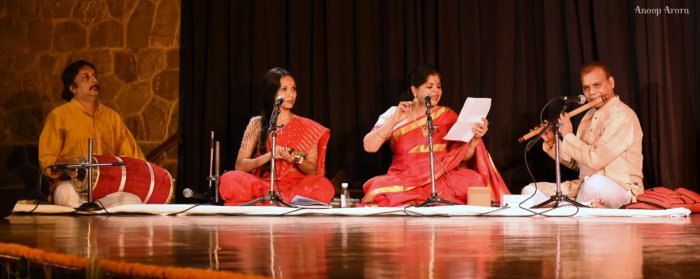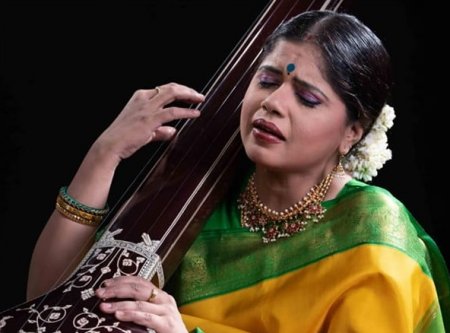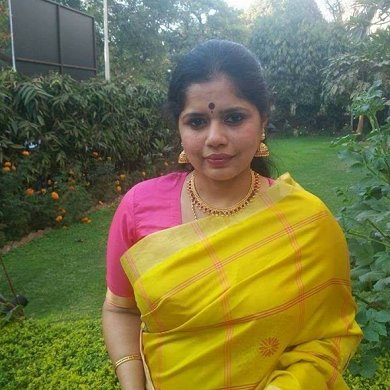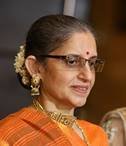
|
 |

|
 |
Sudha Raghuraman: Abhinaya has to come through music as well as dance - Shveta Arora e-mail: arorashveta1806@gmail.com February 13, 2023 Sudha Raghuraman is a renowned Carnatic classical composer and vocalist whom I have had the pleasure of hearing many times over the years, usually in dance recitals. Whether she is performing live or in a recording, Sudha's formidable command over her art, her controlled yet virtuoso style and her intelligent customization and innovation in dance programs leave an indelible impression on the viewer. Watching her perform live is a special experience and always a memorable one - I have found myself humming the refrains from her compositions long afterwards. One such refrain was 'Madhumati aushadhi' from the Bharatanatyam production 'Ratnagarbha', conceptualized and performed by Rama Vaidyanathan in Delhi last year. I spoke to her recently about that production, her career in Carnatic music and about singing for dance. How were you initiated into music? When did you decide to make it a career? I was born into a family of musicians. We lived in a joint family in Karol Bagh where my grandfather and guru, O.V. Subramanyam of the Tanjavur bani, gave Carnatic music lessons. He moved from the Tanjavur district to Delhi and made a huge contribution, especially in Delhi, to bring Carnatic music to this level, and created a legacy - he trained hundreds of students and several of them have further trained many other students. So it became exponential. So it was a very natural call for me because the house was always reverberating with music and students coming in regularly. It was in the genes, obviously, and I used to be extra attentive in my guru's classes. When students performed, I used to, I believe, identify ragas even at the age of three - that's what my grandfather used to say. It was in the air, in the house, and there's a beautiful saying in Tamil that translates to 'even the doors would sing'. That's what they used to say at my grandfather's house, that every part of the house would sing. My father O.S. Sridhar, and my uncles O.S. Thiagarajan and O.S. Arun, of course, all used to sing and the grandchildren would be immersed in music. My grandfather thought that I had a very heavy voice when I was a young girl. So he put me under the tutelage of his friend from the same college, Annamalai University, who also moved to Delhi, a very close friend who used to teach violin. So he put me under him for violin initially, and I learned from my guru V. Janakiraman, for about eight years. Then I switched over to vocal when I attained adolescence. It was then that my voice changed - obviously, it always changes a bit even for women, actually. That's when I thought I could sing and I was keener to learn vocal than violin. I mean, I used to like learning violin, but it's always enchanting to listen to the words, the sahityam, the lyrics, the beautiful melody. I asked my grandpa whether he would teach me, and he obviously accepted me as his disciple and then the rest is history. My parents were very particular that I study; I was very good at academics. My strong subject was Maths. I joined Hansraj College for my Maths Honours. But then, naturally, I got into music. I could not complete Maths Hons as I got married at the age of 21 to Raghu. I finished my graduation once I got married. Of course, academics was always one of my favourites. Given an opportunity, I would have done an MBA or an MCA, but I think destiny definitely took me towards this art form and of course, I got too involved in music and then I got into this profession. I used to teach mathematics; I used to give tuitions also, in fact. But I could not manage both mathematics and music as careers, so I had to choose one and I chose to be a musician. It was not like, one day, I decided that I will only do music. It was very natural. It took some time and then by the time I realized it, I was already in this profession - it was very organic. But Maths remains my favourite subject even now. When my son Ayush was born, I told myself that whatever it is, even if I get really, really busy, I would teach him Maths, science and English. And I actually did that until eighth grade. We never had tuitions. I used to sit with him and teach whatever little I know. I wanted to share the concepts and everything very clearly with him. And by God's grace I was able to do that. Today, I'm proud to say that he is in IIT Chennai, doing his B.Tech.  What do you like more - performing solo or for dance? I started my career as a soloist, obviously, because I was completely trained in Carnatic music by my grandfather, my father and other eminent gurus. I have learnt, for a very short time, from Lalgudi G. Jayaraman sir, Sanjay Subramanyam ji, very, very briefly, and then my uncles also. So I started my career as a soloist, but in 1994, when I was in twelfth grade, my uncle who used to sing for dance wasn't available. My father also used to sing for dance regularly. But they both were not free. There used to be a great critic at that time, Subbudu mama. So Subbudu mama said, "Why don't you sing for this performance?" I said it's not possible, because I've never sung for dance before. But then there's always a first time. My first performance was with a disciple of Guru S. Kanaka called Harini. She performed in Delhi and they asked me to sing for her. I told them many times because I'm still a student, it's not possible for me etc. But they were convinced of my abilities and since music came naturally to me, it was not a very difficult thing for me to sing in the program. And I think I did justice to it and critics also appreciated it. And it never stopped from then. That's how I got into it. Both are equally challenging. Both are important for me. I complement whatever I have learnt with what I get from dance - I've learnt a lot of kritis, obviously, to add to what my gurus have taught. I've also been able to learn new numbers and I've added to my existing repertoire. All that helps me - the technique, the skill, the development, everything else in singing is useful for dance as well. Because you need solid technique, you need solid training, only then can you attempt some challenging ragas, some challenging numbers, padams, javalis etc. Likewise, when you sing for dance, you tend to look into the abhinaya, you are also concentrating on the lyrics, the underlying meaning, the many, many layers, the tanams, every aspect of nritta. In a way, I complement that with my solo and my solo technique with my dance singing. But then I always say that in both, one must have a grip and in both one must have sincerity and honesty. Honesty is very important. We can't say that dance accompaniment is any less and we can't say that solo is difficult. Both are equally challenging. In fact, earlier, in those days, singing for dance was a big taboo. People were asked why do you have to sing for dance when you're a soloist? I never considered myself singing for dance to be any lower. In fact, I enjoy dance singing as much as I enjoy solo singing. There's so much to it. There is a boundary created by the dancer, obviously, and within that framework, I have to think. But then I truly enjoy it - what best can be created within that? I take it as a challenge and it's nice to elevate someone else's performance, isn't it, instead of just being self-centred?  There is a difference -you are the focus when you are singing solo. When I'm doing my solo I feel I'm the queen because I can sing any number of times as per my choice. I can sing the raga of my choice, the song, everything, but then, I think to be able to sing with bhava and rasa. . . I think what I have gained out of dance is this bhava-laden singing. I think one must realize the importance of what it is exactly and how much you enjoy it. You have to be passionate to be able to do both. I always say that youngsters just come and sing, take their payment and go. My mood is not that. Money is definitely important, but it's not everything, right? Whether it is Rama ji (Vaidyanathan) or Geeta ji (Chandran) or any top dancer - Leela Samson, Raja-Radha Reddy ji -I have sung for them all. I enjoy learning from them, there's so much to learn. There's so much to take away. They also tell me that 'when you sing, we get energized and we get a lot to explore spontaneously on the stage' - it's an osmosis. In my solo concerts, the accompanists also challenge me a lot. It's so beautiful when I hear the flute, the violin or the mridangam, the ghatam. When I sing a phrase and they play a phrase it's like an exchange of ideas, it's beautiful to produce good music and with good vibes. When you are singing for a dancer in a thematic production, like you've done with Rama Vaidyanathan and Geeta Chandran, how do you go about it? Especially during the Covid lockdowns, I did quite a number of productions that were really appreciated, both music-wise and choreography-wise. I think we had the time to introspect and reinvent and revisit certain numbers. In a thematic production, I read the synopsis at least five to six times before I even accept it. I must read the concept to work out how much can be done musically. It has to be like a musical. For me, if I do a recording or if I do a piece, when audiences leave the auditorium, they must take something back. If I do music, at least one line has to stay in the heart. It can't be busy, busy music - one hour of just technique and just skill, mathematics, lots of patterns and lots of ragas. No, it doesn't mean that. It has to have that soul-stirring moment. One refrain if they are able to take back when they get home, I feel I have achieved something. It's not to earn a good name or a laurel or something. It's just to reach out. The concert has to reach out musically as well, not only through choreography. Of course, the dancer is the producer. They work so hard, they take the script out and give it to me. But as a responsible composer, as a responsible singer as well, isn't it my responsibility to musically also convey the message of that content or production? There are three ways of looking at it. Sometimes I'm the composer and the singer. Sometimes I'm only the composer, sometimes I'm only the singer. These are three different things to be. When I compose and sing, I exactly know what my voice production is going to be, what I'm going to do with that piece further, how I can elevate it. Sometimes, I'm just a composer, and then I will ask always who's going to sing, what level of musician is going to perform. Because sometimes, if they're not able to manage what my thought process is... I'm not blaming anybody, but sometimes, it does get diluted. Sometimes the singer does it justice. It's a very tricky situation when I'm just the composer. And when I'm just the singer, for example, it's even more challenging. A very basic composition can be given to me and then, you know, many times they ask me to uplift the composition so that they can perform it well. On stage, it is a bigger challenge for me to bring a simple composition to another level. I always say that there is a lot of input by a singer as well, not only the composer, whether it is me or someone else, on how they execute the program based on the thought process. A program and a recording are very different. One line can be sung in ten different ways. Those ten different ways are not always sung and given to me. Only when I'm the composer and singer, I do it for myself. It's a very thin line. So now, I have started to insist that it's very difficult if it is a very young composer and you have asked me to helm it because I also put in a lot of effort. Likewise, when I'm composing a piece and if the singer is not that well trained, not that experienced, then the composition also gets diluted. Anyway, when I read the synopsis, when I understand the concept completely to my satisfaction, then I start to do the music and part by part, I set the scratch. I believe in sending it on time. I do not like my producers to be waiting unnecessarily for the composition. Many friends of mine make fun of me saying, 'why do you have to give it immediately? You are a senior musician.' For me, senior and junior don't matter. For me, they're waiting for some work they have given to me; if I've given them a timeline, it's my duty to give it to them on time. Once the music is done, the scratch is given to the dancer and they go through it to check whether it is completely suitable. Many times, God has been kind, it's suitable and it's just basic tweaking here and there. Then we come to a midpoint and start rehearsing or recording. It's important for me to understand the concept and diction completely. I like to work on diction because it can be a Telugu text, or it can be Tamil, Kashmiri, Marathi, Bengali - today, I learnt a Bengali song. It can be any language and I have no right to mispronounce any language. As much as I feel bad when they sing wrong Tamil, they will also feel bad if their language is mispronounced. If I don't know then I will ask. I ask them to record it in their language and send me a voice note, and then I will pick up the accent. I may not be perfect, but at least I will try.  How much is the give and take between the dancer and you, when it comes to the mood of the production? When I do the scratch, I envision it in my mind. Naturally, the dancer provides the synopsis - they have already ideated the whole production. We discuss and then I have to absorb the essence of the thematic production. It is very important that I get the essence, that one thing which is to be conveyed through the production. If I understand that, then I like to do the music. I watch the choreography and naturally, we start to work on the embellishment of the text and the compositions. When we bring it to another level is when we actually perform it or record it. Naturally, once the scratch is done, they choreograph and then they bring it back to me - these are the number of times or these are the lines that I would like to elaborate upon, the improvisational part, I want your aalaap here etc. Then I work on it again. It's a two-way process. At least two drafts are done, and then we sit, rehearse; if it is a recording naturally it is a closed unit. Still, I like to see the dancer and sing. I just don't like to hold my paper and not look at the dancer. I think music and dance are inseparable and I feel dance is nothing without music. It's important to be able to be in that journey with the dancer during the performance; whether it is recorded or live, it is very important to get that mood, be in that mood. I think it is also important to know each and every word's meaning, and the complete meaning of that line, or the piece or the composition of padam or javali, whatever it is. Unless I enjoy myself because I understand the meaning, how am I going to create rasa in the audience? One must forget oneself and perform. It's very experiential. The abhinaya has to come through music as well. And in the nritta part of course the technique plays an important role - how much grip you have over the laya, over the tala. We are so rich with sahitya in India, it is beautiful to explore new poets, both traditional and contemporary. It's important to work on each and every aspect of the text, melody, rhythm, music, composition, production, the dancer's comfort and as a team with my musicians as well. It's not just me who's performing. So I have to direct what is to be played on the flute, what is to be played on the mridangam and how is it going to sound exactly. It's a lot of work. It is not physical, it is mental work. And I'm a scriptwriter, I don't believe in all this e-paper. I do use iPads these days because I have to but I always prefer to write my script with my hand, with my pen, and notate it properly theme-wise. Once I do my final scripting is when I give photocopies to my musicians and whoever else requires it. My scriptwriting is my strength. In fact, I learnt to notate when I was very, very young. Notating a script is not very easy, especially for dance, but I have my own formula because I'm from a maths background; I create my own formulae to remember five and a half times or four and a half times of whatever it is. So scripting is very important, and to be able to follow what you have written. One has to be extraordinarily alert in a dance production. Now that we are talking about recording, what is your preference - live on the stage with the dancer or to record? In live performances, the energy that you receive from the audience, the other musicians sitting by you and the dancer you're watching is incomparable. No, there's no comparison to live shows. But during Covid, I have also been able to update myself a lot. And I have been able to record some of the finest productions, like Beyond Boundaries by Rama Vaidyanathan - fabulous choreography and thought process, her theme was just outstanding. And I think the music also came beautifully. In fact, I create the skeleton first. I do the composition, then I alone sing on metronome, and then one after the other, I fill it and then mix and master it. So direction is also part of recording. It is very challenging to create the mood during a recording because it's a closed unit. We don't have anybody sitting. I have learnt to understand the fact that when there is no choice, you have to do that. Let's talk about this production, Ratnagarbha, that you've done with Rama Vaidyanathan. The first piece was Ratnagarbha. The second was a kriti, that was not my composition but a traditional composition called Ye Annapurneshwari. The last one was Chandalini that we worked on during Covid. It was her concept, very beautiful and powerful. But I used a different methodology to create music for that because....you must have seen in the choreography, that is like - jhootha khaati hai (she eats refuse). It's very raw. So basically that rawness in music had to also come. That's when I decided to use two voices at the end, the tantric chant and the melodic way of singing - the same lyrics were sung in both ways. We wanted to use something which is raw and powerful, fierce and something which is more of lasya. This I brought out in the voices. It is extremely strenuous, but then because it was the last piece I could do it. And how did you go about the ragas? The first piece is in a very rare raga called Vakulabharanam. And I used nine matra, eight matra, seven matra, reducing factor. It was in three parts - Vakulabharanam, Latangi and Durga, three ragas were used. Ye Annapurneshwari is a traditional composition of Muthuswami Dikshitar. Chandalini was again in three ragas - Gamanashrama, Vagadheeswari and Shubhapantuvarali for that last powerful part. It evokes that emotion. When I am given the script, it may have two lines, four or just one, sometimes not even metrical - setting it to metre, construction of lyrics/words into a proper avartan, making it sound natural, organic, beautiful, is the most challenging part. E.g., the line Madhumati aushadhi... was one line given to me. How do you go about it? It has to sound earthy, talking about roots, like from the ground. So the first thing that came to my mind was to use a lower octave and a raga which has those haunting rishabhas, and a raga not used very often so that it's sung in a mystic way also. It has to come in a metre - the construction is the most important part. Madhumati aushadhi - that one line was memorable. That is the fulcrum of the whole production.  Shveta Arora is a dance-mad writer who chronicles classical dance events in Delhi (and also those online). In 2009, she started the blog Kala Upasana at delhiculturecomment.blogspot.com, where she began posting her own writing along with photographs clicked by Anoop Arora, her husband. She's been dancing all her life as a devotee, but resumed her formal training in Kathak in her 50s and has passed her fifth year Kathak exams. Post your comments Please provide your name and email id when you use the Anonymous / blog profiles to post a comment. All appropriate comments posted with name and email id in the blog will be featured in the site. |